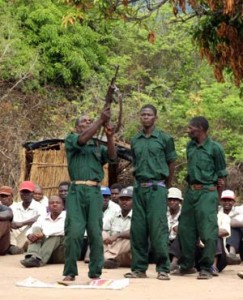 The meeting was supposed to continue the discussion begun on Monday on the integration of Renamo gunmen into the Mozambican armed forces (FADM) and police.
The meeting was supposed to continue the discussion begun on Monday on the integration of Renamo gunmen into the Mozambican armed forces (FADM) and police.
The head of the international mediating team, the Italian Mario Raffaelli, also refused to give any substantial information to reporters. “I have nothing to say. The work will continue on the matters under discussionâ€, was all that he could be persuaded to utter.
The Joint Commission will meet again on Friday. On Thursday, there will be a meeting on decentralization, at which one of the speakers will be Daviz Simango, mayor of Beira, and leader of the opposition Mozambique Democratic Movement (MDM).
The MDM is proposing constitutional amendments which would reduce the powers of the President of the Republic, increase those of the provincial assemblies, and ensure election of the provincial governors.
Cited in Thursday’s issue of the independent daily “O Paisâ€, Raffaelli said that Simango had asked for the opportunity to explain the MDM proposal to the members of the Joint Commission.
“I spoke with the parties (the government and Renamo delegations) and they agreedâ€, said Rafaelli. “It’s not a negotiation. They (the MDM) will present the proposal and, if we have any doubts, we shall ask questionsâ€.
MDM spokesperson Sande Carmona, cited by the Portuguese news agency Lusa, said that on Wednesday the MDM met with extra-parliamentary parties, and members of civil society organisations to debate the proposal, in order to improve it.
Parts of the MDM’s proposals find some support within the ruling Frelimo Party. Thus Frelimo Central Committee member Teodatao Hunguna, who is a former judge on the Constitutional Council, and has held several government positions, including Justice and Information minister, on Monday called for the election of provincial governors.
Giving a lecture in Maputo at the Higher Institute of International Studies (ISRI), Hunguana said that decentralization is a necessity for democracy and the development of the country. He said it made no sense to elect provincial assemblies, but have the provincial governor appointed centrally.
This was a gap that should have been filled long ago. It was the constitutional amendments of 2004 that established the directly elected provincial assemblies, but kept the power of appointing provincial governors in the hands of the President.
“It is beyond comprehension that we have had two elections for provincial assemblies (in 2009 and 2014) but without including the election of governorsâ€, said Hunguana. Just as legislative and executive bodies (the parliament and the President) were elected at national level, so the same should occur in the provinces, he argued.
Many of the current problems could have been avoided if the constitutional amendments of 1999 (partly drafted by Hunguana when he as a leading figure in the Frelimo parliamentary group) had been passed.
Those amendments would have changed Mozambique’s system of governance from a presidential to a semi-presidential one. They would have separated the posts of head of state and head of government, reducing the powers of the President and increasing those of the Prime Minister and of parliament. The amendments would also have made it possible to impeach the President.
The amendments were proposed by an ad-hoc commission, on which all parliamentary groups were represented. But at the last minute, Renamo withdrew its support, thus depriving the amendments of the two thirds majority they needed to become law.
It was widely believed that Renamo changed its position, because it thought it would win the 1999 general elections, and its leader, Afonso Dhlakama, wanted to hold on to the extensive powers granted to the president by the existing constitution.
One Renamo deputy, the late David Alone, put the new Renamo position very bluntly in the 1999 parliamentary debate. “In Africa, the chief rulesâ€, he said. “Everything else is cheap philosophyâ€.
Post published in: Africa News

